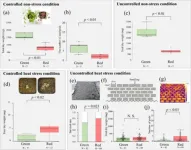(Press-News.org) ESMO announces Public Policy Manifesto on key issues for oncology to bring to European institutions after 2024 elections.
Studies presented at the ESMO Congress 2023 set new standards of care across a wide range of tumour types.
Madrid, Spain, 20 October 2023 – Evidence is building up that strong political action has the potential to tackle two of our era’s biggest challenges: climate change and the increasing burden of cancer on society. At the opening press conference of the ESMO Congress 2023 taking place 20-24 October in Madrid, Spain, a slew of studies marking meaningful advances in the treatment of various tumour types was announced together with new insights into potential cancer risks from air pollution, which ESMO has translated into a concrete call to action for policymakers with a Public Policy Manifesto addressing this and other critical issues for oncology.
In a context where air pollution is increasingly understood to be a driver of both global warming and cancer on a broader scale than previously suspected, mitigation strategies take on a new importance that ESMO has already been actively advocating for in EU policy circles. “With its 33,000 members, ESMO is producing the science and the information that national and EU political decision-makers need to adapt our healthcare systems to evolving priorities in oncology,” said ESMO Director of Public Policy Prof. Jean-Yves Blay, highlighting the role of cancer prevention in improving the resilience of Europe’s health systems, an imperative widely recognised since the pandemic and reiterated in the ESMO Public Policy Manifesto.
“We need, on the one hand, structural resilience to ensure cancer patients can continue to be treated in periods of crisis, and, on the other, a resilient oncology workforce,” said Blay. “We have seen shortages of human resources in many countries at the same time as we have experienced increasing workloads due to the growing number of cancers being diagnosed and treated each year, and which are putting pressure on all healthcare systems indiscriminately.”
The Public Policy Manifesto, which crystallises ESMO’s evidence-based approach to tackling cancer both within the bloc and, when feasible, globally, prepares the ground for effective policymaking in anticipation of the 2024 elections for the European Parliament by highlighting necessary measures to protect the oncology workforce and cancer patients—including in times of crisis—as well as major axes of cancer prevention ranging from air pollution and asbestos exposure to tobacco and alcohol consumption.
As Blay reported, another challenging question on which ESMO wants to work with EU policymakers concerns how best to ensure equitable access to the transformative therapies entering clinical practice today for all patients, including those with rare cancers, in the future. “This is particularly relevant in the current context of evolving EU regulation on health technology assessment,” he noted. Equity is also what motivates ESMO’s advocacy, including through the new manifesto, for the right of cancer survivors to have their disease forgotten when they seek financial services upon returning to normal life.
ESMO is also working to help shape the implementation of EU legislation such as the In Vitro Diagnostic Regulation and the upcoming European Health Data Space, which will have an impact on cancer research and will be critical to bringing Europe’s expertise in health technology to global fruition. “ESMO is unique in its size, its global perspective, and its ability to disseminate practice-changing evidence across a broad range of oncological diseases, as is being demonstrated once again with this year’s Congress,” said Blay. “National and EU policymakers therefore naturally listen to the quality of expertise we provide.”
A look at the highlights of the ESMO2023 scientific programme
As the Society’s flagship annual meeting, the ESMO Congress is one of the foremost forums in which evidence is discussed and disseminated, within the oncology community and to the wider public. Accordingly, the scientific programme of the ESMO Congress 2023 is the reflection of a field of medicine where progress is rapid and wide-sweeping, with important clinical trial results announced in a multitude of tumour types and disease settings.
“This ESMO Congress is full of data that will truly change practice for our patients, but in particular, 2023 will go down as the year of lung cancer abstracts,” emphasised ESMO 2023 Scientific Chair Prof. Silke Gillessen, anticipating the profusion of therapeutic advances that will be the subject of many presentations over the next five days.
In the field of gynaecological malignancies, promising new results covering the entire spectrum of cervical cancer and with the potential to change the treatment landscape, will also be presented throughout the ESMO Congress.
ESMO President Prof. Andrés Cervantes commented: “Cervical cancer is still very prevalent, especially in low and middle-income countries, and this Congress brings good news to women suffering from all stages of the disease.”
Meanwhile, new treatment combinations (1) (2) could for the first time in decades lead to changes in the standard of care for advanced urothelial carcinoma, the most common form of bladder cancer. “In particular, a new drug combined with immunotherapy will, if approved, replace the standard chemotherapy that we have been administering for over 20 years as the first line of treatment,” Gillessen continued.
In metastatic prostate cancer, a new type of precision nuclear medicine capable of delivering targeted radiation to cancer cells, and thus preserving surrounding tissue, showed its potential to move up in the therapeutic sequence by delaying disease progression compared to the standard second-line treatment. (3) Findings which, according to Gillessen, are made all the more promising by the good tolerability of the novel therapy.
Based on further results to be presented during a presidential session on Sunday, two other targeted therapeutic approaches are also pushing back the survival horizon for heavily pretreated patients with metastatic breast (4) and colorectal cancers. (5) “KRAS mutations are present in almost half of all colorectal cancers and have traditionally been associated with poorer prognosis because they limited the treatment options available to patients. Now, a new combination of antibodies and RAS inhibitors has been shown to improve survival compared to the standard of care and, incredibly, turned this mutation into a positive predictor of better outcomes,” said Cervantes, highlighting the significance of this breakthrough for patients.
In a phase III trial described by Gillessen as a research prowess for a rare disease, important new answers were also obtained regarding the optimal course of treatment for people suffering from RET-mutant medullary thyroid cancer—a rare endocrine tumour—as a selective RET inhibitor demonstrated its superiority to other, broader-spectrum targeted therapies approved in this indication. (6)
“This year is one that will be remembered in oncology, and not just by the record 30,000 attendees we are expecting to join the Congress from 144 countries,” concluded ESMO 2023 Press Officer Dr. Angela Lamarca Lete. “With over 2,500 studies to be presented, including 147 presidential and proffered papers set to change clinical practice, there will be a before and an after to the ESMO Congress 2023.”
-END-
Notes to Editors
Please make sure to use the official name of the meeting in your reports: ESMO Congress 2023
Official Congress Hashtag: #ESMO23. Follow it to stay up to date and use it to take part in the conversation on X (Twitter), LinkedIn, Instagram, Facebook
Disclaimer
This press release contains information provided by the author of the highlighted abstract and reflects the content of this abstract. It does not necessarily reflect the views or opinions of ESMO who cannot be held responsible for the accuracy of the data. Commentators quoted in the press release are required to comply with the ESMO Declaration of Interests policy and the ESMO Code of Conduct.
References
1 Abstract LBA7 ‘Nivolumab plus gemcitabine-cisplatin versus gemcitabine-cisplatin alone for previously untreated unresectable or metastatic urothelial carcinoma: results from the phase 3 CHECKMATE 901 trial’ will be presented by Michiel S. Van der Heijden during the Presidential Session, Sunday 22 October, 16:42 - 16:54 CEST in Madrid Auditorium - Hall 6.
2 Abstract LBA6 ‘EV-302: A 2-arm, open-label, randomized controlled phase 3 study of enfortumab vedotin in combination with pembrolizumab vs chemotherapy alone in previously untreated locally advanced metastatic urothelial carcinoma (la/Muc)’ will be presented by Thomas B. Powles
during the Presidential Session, Sunday 22 October, 16:30 - 16:42 CEST in Madrid Auditorium - Hall 6.
3 Abstract LBA13 ‘Phase 3 trial of [177Lu]Lu-PSMA-617 in taxane-naive patients with metastatic castration-resistant prostate cancer (PSMAfore)’ will be presented by Oliver Sartor during the Presidential Session, Monday 23 October, 17:10 - 17:22 CEST in Madrid Auditorium - Hall 6.
4 Abstract LBA11 ‘Randomised phase 3 study of datopotamab deruxtecan vs chemotherapy for patients with inoperable or metastatic hormone receptor-positive, HER2-negative breast cancer: First results from TROPION-Breast01’ will be presented by Aditya Bardia during the Presidential Session, Sunday 22 October at 16:30 - 16:42 CEST in Madrid Auditorium - Hall 6.
5 Abstract LBA10 ‘Sotorasib plus panitumumab versus standard-of-care for chemorefractory KRAS G12C-mutated metastatic colorectal cancer (MCRC): CodeBreak 300 phase 3 study’ will be presented by Filippo Pietrantonio during the Presidential Session, Sunday 22 October at 17:50 - 18:02 CEST in Madrid Auditorium - Hall 6.
6 Abstract LBA3 ‘Randomized Phase 3 Study of Selpercatinib versus Cabozantinib or Vandetanib in Advanced, Kinase Inhibitor-Naïve, RET-mutant Medullary Thyroid Cancer’ will be presented by Julien Hadoux during the Presidential Session, Saturday 21 October, 17:10 - 17:22 CEST in Madrid Auditorium - Hall 6.
About the European Society for Medical Oncology (ESMO)
Representing more than 33,000 oncology professionals from 170 countries worldwide, ESMO is a reference for oncology education and information. Driven by a shared determination to secure the best possible outcomes for patients, ESMO is committed to standing by those who care about cancer through addressing the diverse needs of #ONEoncologycommunity, offering #educationforLIFE, and advocating for #accessiblecancerCARE. www.esmo.org
END
ESMO Manifesto - Translating scientific evidence into effective public health policy
2023-10-20
ELSE PRESS RELEASES FROM THIS DATE:
Massachusetts Life Sciences Center awards $4.3 million to MBL to support imaging innovation
2023-10-20
WOODS HOLE, Mass.—The Massachusetts Life Sciences Center (MLSC) has awarded $4.3 million to the Marine Biological Laboratory (MBL) to expand its imaging capabilities to serve the Massachusetts life sciences community.
The grant, which will be used to procure two state-of-the art microscopes capable of increased resolution and advanced technology, such as milling for the reconstruction of samples in 3D, was announced at a press conference on October 18 at the grand opening of a new incubator, the Massachusetts Biomedical Initiatives (MBI).
MBL Director of Research Anne Sylvester ...
Does urbanization trigger plant evolution?
2023-10-20
Urbanization and human activities have transformed a significant proportion of the land on Earth, resulting in the formation of urban environments. These urban environments are man-made habitats that often impose several selective pressures on their inhabitants. A key characteristic of such environments is the presence of impermeable, heat-retaining surfaces created using brick, stone, asphalt, and concrete. Notably, these surfaces form urban heat islands, i.e., regions with elevated surface temperatures. An unexpected result of heat stress ...
Why do some men not produce sperm?
2023-10-20
KANSAS CITY, MO—October 20, 2023—Millions of couples worldwide experience infertility with half of the cases originating in men. For 10% of infertile males, little or no sperm are produced. Now, new research from the Stowers Institute for Medical Research, in collaboration with the Wellcome Centre for Cell Biology at the University of Edinburgh, is shedding light on what may be going wrong in the process of sperm formation, leading to potential theories on possible treatments.
“A ...
Harsh workplace climate is pushing women out of academia
2023-10-20
Women faculty are more likely to leave academia than men faculty throughout all career stages in U.S. universities, University of Colorado Boulder researchers revealed in the most comprehensive analysis of retention in academia to date.
The team published the findings Oct. 20 in the journal “Science Advances.” The researchers found that a harsh workplace climate, which can include harassment and feelings of not belonging, was the most common reason women left academia. This attrition affects not only early-career professionals, ...
Dingoes given ‘almost-human’ status in pre-colonial Australia
2023-10-20
It's said that a dog is a man’s best friend, but the wild dingo is much maligned in Australia. This may not always have been the case though, with new research led by experts at The Australian National University and The University of Western Australia suggesting that dingoes were buried – and even domesticated – by First Nations people prior to European colonisation.
The researchers examined remains at the Curracurrang archaeological site, south of Sydney, where radiocarbon dating of dingo bones revealed the animals were buried alongside humans as far back as 2,000 years ago.
The care taken to bury the animals ...
Soft, living materials made with algae glow under stress
2023-10-20
A team of researchers led by the University of California San Diego has developed soft yet durable materials that glow in response to mechanical stress, such as compression, stretching or twisting. The materials derive their luminescence from single-celled algae known as dinoflagellates.
The work, inspired by the bioluminescent waves observed during red tide events at San Diego’s beaches, was published Oct. 20 in Science Advances.
“An exciting feature of these materials is their inherent simplicity—they need no electronics, no external ...
Army of specialized T cells may trigger asthma attacks in older men
2023-10-20
LA JOLLA, CA—Scientists from La Jolla Institute for Immunology (LJI) and The University of Southampton, UK, have uncovered a group of immune cells that may drive severe asthma. These cells, called cytotoxic CD4+ tissue-resident memory T cells, gather in the lungs and appear to possess the molecular weaponry to cause the most harm in men who developed asthma later in life.
"If you are male and you develop asthma after age 40, there's a high chance this T cell population is in your lungs," says LJI Research Assistant Professor Gregory Seumois, Ph.D., who co-led the study with LJI Professor Pandurangan ...
A cancer survival calculator is being developed using artificial intelligence
2023-10-20
Key Takeaways
A cancer survival calculator prototype developed with machine learning showed that for each of three cancer types tested, more factors than cancer stage significantly influenced patients’ survival.
Preliminary research on the calculator found high accuracy of this individualized survival estimator.
BOSTON (October 20, 2023): Researchers have developed an artificial intelligence (AI)–based tool for estimating a newly diagnosed cancer patient’s chances for surviving long term, according ...
Study links school redistricting to higher rates of firearm violence in urban communities
2023-10-20
Key takeaways
This is the first study to examine the impact of school redistricting on firearm violence in urban communities, examining data from 63,000 urban census tracts.
Any school redistricting event was associated with a 10.6% higher firearm incidence rate compared with communities that had no redistricting, and school boundary adjustments were associated with a 21.3% increase.
In areas that had a school redistricting event, firearm violence increased 14% in the year the redistricting occurred over the previous year.
BOSTON (October 20, ...
East Los Angeles program to remove tattoos may help reduce traumatic injuries
2023-10-20
Key Takeaways
Tattoos, especially those related to gangs and sex work, can make individuals targets for violence.
Tattoos may also make it more difficult for individuals to make changes in their lives, including finding a job or joining the military.
Nearly nine out of 10 of the program’s clients (88%) desired tattoo removal to transition to a healthier life, and more than eight of 10 clients (81%) reported success in achieving their goals after tattoo removal.
BOSTON (October 20, 2023): Tattoo removal may help to reduce violence and trauma in East Los Angeles, according to study results being presented at the American ...







